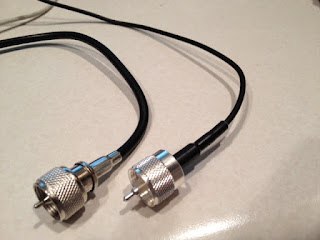Sometimes backpackers go a little over board to save weight. I once knew a backpacker who even cut the handle off of his toothbrush to save weight. It is a good practice to be weight conscious, but there are always tradeoffs.When deciding what coax to carry on your wilderness radio trip there are a couple of things to consider.
Until recently I was more focused on the loss factor of coax, not it's weight, but that is. because I operate my home station from a chair, I don't have to carry anything. However when climbing a mountain peak or hiking for an extended distance with everything you have on your back, a little compromise might be in order. There are two things to consider when deciding how much coax to carry.
- Will you carry an antenna that is fed at its peak (dipole) or one that is fed at ground level?
- Ground level feedpoints allow you to get by with less coax.
- End Fed Antenna
- Verticals
- Loops
- Center fed antennas will require more coaxial cable
- What spec of coax will you carry?
I have several RG-58 jumpers, but I have recently discovered LMR-100. When looking at the loss factor per 100 feet, the numbers don't look that good at first glance. RG-58 has a loss factor of 1.4 DB per 100 feet and LMR-100 has a loss factor of 2.2 DB at 10 MHz. However I will only be using a 4 foot jumper from my antenna to the radio. That small jumper would have a loss factor of (2.2/100) *4 ft = .09 DB. That is less than 10% of 1 DB. Not much loss and its easier to pack. The weight differences between RG-58 and LMR-100 aren't great at the 4 ft. jumper level, but the more coax you need to carry, the more thought should go into how much coax weigh you want to carry..
LMR-100 vs RG-58

I'm not sure if it's LMR-100 but on my Larson trunk lip mount there is a thin coax. I use this mount when in a park and close to the car. Just get it onto the hatch with a mobile whip on it and out to either the K2 or KX3 and bingo bango I'm in business.
ReplyDeleteMike